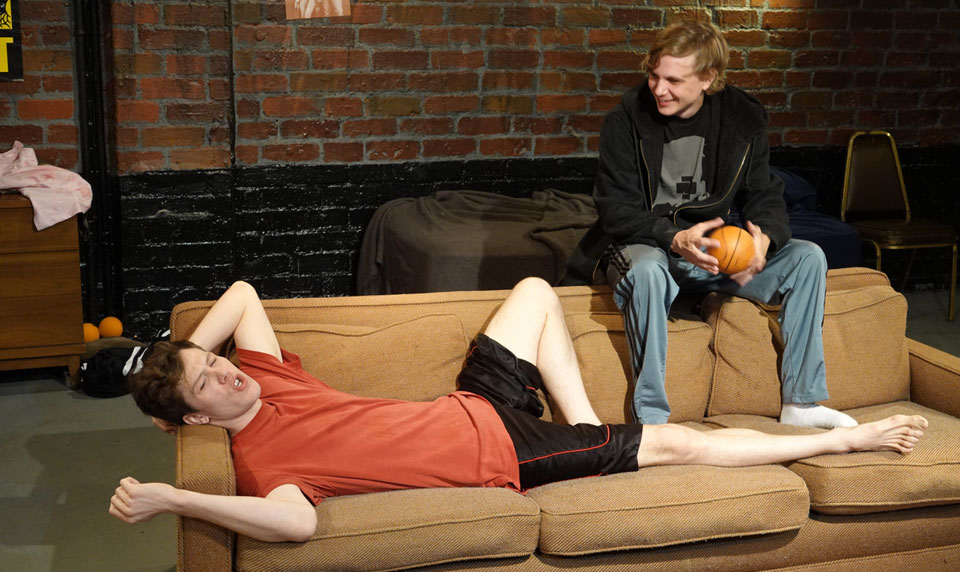
LOS ANGELES — “It’s the late ’90s and you’re hanging out in the basement of an average home, somewhere in suburban America, with two teenagers as they stay up on a school night; chugging soda, watching MTV and preparing for the future. As the morning approaches, their seemingly innocent sleepover reveals another purpose…what are they doing down here?”
This was the publicist’s promo for Rogue Machine’s world premiere production of playwright Tim Venable’s The Beautiful People. Honestly, I wasn’t that curious to find out the answer to that question until I saw the name of Guillermo Cienfuegos as director, and that piqued my interest. He’s one of those figures on the L.A. theater scene whose work I consistently find of the highest quality—PW has reviewed his work on Disposable Necessities, Dutch Masters, Ready Steady Yeti Go, Rhinoceros, and Between Riverside and Crazy.
Okay, then, count me in. Rogue Machine makes a point of presenting plays that are new to Los Angeles. I still didn’t know much of what the play was about, but who knows if I’d ever come across this work again? We attended opening night, June 25.
“I felt like I knew these boys, that my friends and I weren’t that different,” says playwright Tim Venable. While they are pulling an overnighter in 1’s basement den (the characters are only listed as 1 and 2), having their version of fun, “all the while they were harboring this terrible plan? I wanted to explore that duality.”
This “terrible plan,” it turns out, was something very akin to the Columbine High School massacre of April 30, 1999, perpetrated by Eric David Harris and Dylan Klebold. It was at the time the largest U.S. school shooting incident ever.
“This season at Rogue Machine we’ve committed ourselves to having difficult conversations,” states Cienfuegos. “That doesn’t mean being provocative for its own sake—it means presenting stories and posing questions that don’t have easy answers. I don’t know how audiences will respond to this play—but I do know that the conversation needs to happen, and I am powerfully drawn to directing this piece because I know that is its mission.”
The director believes “this country has an addiction, is in denial about it and needs to be steered toward a searching and fearless moral inventory.” That addiction could possibly be identified as untrammeled male supremacism with a fatal co-addiction to guns.
Alexander Neher (whom we recently saw in Tambo and Bones) plays 1, an alpha-type bully who revels in having 2 (Justin Preston) as his loyal camp follower and punching bag. Both are absolutely superb young actors, and Cienfuegos has brought out their widest possible range of emotions and physical expression. They’re pretty impressive basketball shots, too—there’s a little hoop down there.
Beautiful people? These still developing adolescents are struggling with self-image, self-knowledge, self-worth, intimacy, virginity. Where does all their anger come from? One place we know: 1’s dad is a Vietnam vet proud of how many people he killed there. 1 has imbibed his father’s essential void of empathy toward other human beings and a disposition to inflict humiliation and pain. Hardly anyone has ever been held accountable for U.S. crimes in that war, and reparations have been extremely spotty at best.
Perhaps 1 and 2 are “beautiful” only ironically in what they represent—the globally transcendent heterosexual white American male. Hell, they’re so obnoxious they can’t even get laid. Perhaps there’s an incel factor here as well—resentment, anger over their “involuntary celibate” status because no one will have them, so they cast a wide net of blame before they’re willing to examine their own behavior.
Another possibility is repressed homosexual feeling. The script strongly suggests this.
Maybe they are “beautiful people” in their potentiality, if not at the moment we meet them. Suppose some guidance counselors, or their parents, had noticed any concerning “red flags” and had gotten them into therapy. These healthy, intelligent young men could certainly have amounted to something some day.
More than a play about Columbine, The Beautiful People is about how a strong, aggressive person can mesmerize others (millions, in some cases) by manipulating their fears and anxieties. In that sense, though the play unfolds in less than an hour and a half, it probably is best understood as the evolution of a toxic relationship between subject and object over the course of months or even years. What we see on stage is but the culmination of a set of patterns and expectancies that are now deeply embedded in these two characters. Any comparison to powerful male political figures who manage to hypnotize hordes of fanatical followers by the attraction to their aura is fully intended.
The play has many scary moments, frightening verbal assassinations of other people’s humanity—women, in particular—and quite a few violent interactions between the two boys. It could be troubling viewing for many theatergoers, a new entry into that catalogue of the “theater of cruelty” that sadly reflects a great deal of what is out there in the world walking among us. There’s nothing gratuitous about inviting this conversation.
On the creative side, David Mauer did the highly effective production design that takes us not just into a literal basement but into the dank cellars of the human mind. Christopher Moscatiello created the sound design, Jonathan Rider was the flight director, with video by Michelle Hanzelova.
The Beautiful People runs through July 31 (not on July 4), with performances at 8 pm on Fri., Sat. and Mon., and Sun. at 3 pm. Rogue Machine performs at the Matrix Theatre, 7657 Melrose Ave., Los Angeles 90046. Tickets can be had at www.roguemachinetheatre.net, or for more information call (855) 585-5185. There are general admission, senior, and student rates, and Pay-What-You-Can on July 8 and 15. Patrons must present proof of full vaccination against COVID-19 along with a government-issued photo ID in order to attend. Face masks are required to be worn indoors at all times. The run time is approximately 80 minutes (no intermission). This play engages subjects of sex, suicide and murder; suggested for age 18+ only.
Jo Allen-Eure contributed to this review.












Comments